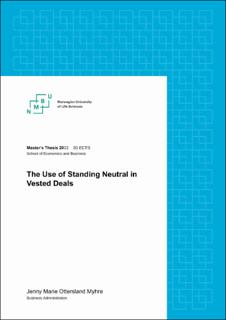| dc.contributor.advisor | Korhonen-Sande, Silja Marianna | |
| dc.contributor.author | Myhre, Jenny Marie Ottersland | |
| dc.date.accessioned | 2022-10-28T07:23:12Z | |
| dc.date.available | 2022-10-28T07:23:12Z | |
| dc.date.issued | 2022 | |
| dc.identifier.uri | https://hdl.handle.net/11250/3028751 | |
| dc.description.abstract | Formålet med denne masteroppgaven er å studere hvordan og hvorfor bedrifter i Facility Management-bransjen velger å implementere Standing Neutral i Vested outsourcing-avtaler. Mange bedrifter outsourcer sine Facility Management-tjenester, men disse kunde-leverandørrelasjonene er ofte preget av et ubalansert partnerskap der en part undergraves av den andre. For å løse konflikter som kan oppstå i denne typen situasjoner, tyr selskaper vanligvis til Alternative Dispute Resolution-teknikker (ADR), som mekling. Disse ADR-teknikkene er reaktive, noe som betyr at de implementeres etter at det allerede er konflikt mellom partene, og det kan av denne grunn bli problematisk å ivareta relasjonen. Det kan således argumenteres for at det er behov for en ny tilnærming som er mer proaktiv og sikrer gode muligheter for langsiktig samarbeid. Standing Neutral foreslås som et slikt alternativ. En slik proaktiv og nøytral tredjepart er vanligvis en del av styringsstrukturen, og kan være en umiddelbart tilgjengelig ressurs dersom problemer skulle oppstå.
Standing Neutral har blitt benyttet i outsourcing-avtaler i flere tiår, men effekten av denne ADR-teknikken innenfor Facility Management-industrien krever mer forskning. Denne masteroppgaven tar for seg bruken av Standing Neutral i Vested-avtaler innenfor nevnte bransje. Vested-modellen karakteriseres av selskaper som ønsker å samarbeide og skape en vinn-vinn-situasjon for alle parter. Standing Neutral ble først introdusert som en del av Vested forretningsmodellen i 2011.
Studien er designet som en eksplorativ flercasestudie av hvordan og hvorfor bedrifter bruker Standing Neutral i sine Vested-avtaler. Metodologisk og metodisk anvendes kvalitative semistrukturerte intervjuer av eksperter og informanter i Vested-avtaler. Funn i studien tyder på at det er flere fordeler ved å bruke Standing Neutral i Vested-avtaler, blant annet fordi eskalering av problemer kan unngås gjennom den nøytrales proaktive tilnærming i relasjonen. Videre antyder studien at Standing Neutral som en ADR-teknikk kan modifiseres for å møte partenes behov, samt at det kan være konstruktivt å bruke en kombinasjon av Standing Neutral-roller. Studien konkluderer med en revidert forklaringsmodell av konseptet Standing Neutral, som muligens kan bidra til større forståelse for den nøytrales rolle og potensialer i Vested-avtaler eller andre relasjonsbaserte kontrakter. | en_US |
| dc.description.abstract | The purpose of this master's thesis is to study how and why companies in the Facility Management industry choose to implement Standing Neutral in Vested outsourcing agreements. Many companies outsource their Facility Management services, but these buyersupplier relationships are often characterized by an unbalanced partnership in which one party undermines the other. To resolve conflicts that may arise in this type of situation, companies typically resort to Alternative Dispute Resolution (ADR)-techniques, such as mediation or arbitration. These ADR-techniques are reactive, which means that they are implemented after there is already a conflict between the parties, and for this reason it can be problematic to maintain the relationship. It can thus be argued that there is a need for a new approach that is more proactive and ensures good opportunities for long-term cooperation. Standing Neutral is suggested as such an option. Such a proactive and neutral third party is usually part of the governance structure and can be an immediately available resource should problems arise.
Standing Neutral has been used in outsourcing agreements for decades, but the effect of this ADR-technique in the Facility Management industry requires more research. This master's thesis deals with the use of Standing Neutral in Vested agreements within the mentioned industry. The Vested model is characterized by companies that want to collaborate and create a win-win situation for all parties. Standing Neutral was first introduced as part of the Vested business model in 2011.
The study is designed as an exploratory multi-case study of how and why companies use Standing Neutral in their Vested agreements. Methodologically the study rests on qualitative semi-structured interviews of experts and companies in Vested agreements. Findings in the study suggest that there are several benefits to using a Standing Neutral in Vested deals, for example, escalation of problems can be avoided through the neutral's proactive approach in the relationship. Furthermore, the study suggests that Standing Neutral as an ADR-technique can be modified to meet the needs of the parties, and that it might be constructive to use a combination of Standing Neutral roles. The study concludes with a revised model of the concept of Standing Neutral, which may contribute to a greater understanding of the neutral's role and potentials in Vested agreements or other relationship-based contracts. | en_US |
| dc.language.iso | eng | en_US |
| dc.publisher | Norwegian University of Life Sciences, Ås | en_US |
| dc.rights | Attribution-NonCommercial-NoDerivatives 4.0 Internasjonal | * |
| dc.rights.uri | http://creativecommons.org/licenses/by-nc-nd/4.0/deed.no | * |
| dc.subject | Outsourcing contracts | en_US |
| dc.subject | Facility management | en_US |
| dc.title | The use of standing neutral in vested deals | en_US |
| dc.type | Master thesis | en_US |
| dc.description.localcode | M-ØA | en_US |

